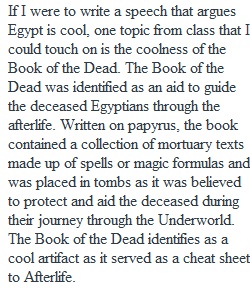


Q We are now ending the first half of the semester — the Egypt half — and so let's take stock. Egypt as old In terms of human culture, ancient Egypt is really old, and it lasted a really long time. For example, Cleopatra is closer in time to the Model-T Ford than to the Great Pyramid of Giza! Cleopatra lived about 20 centuries BEFORE the Model T, and about 25 centuries AFTER the pyramid was built. In fact, Cleopatra is closer to us today than to the Giza Pyramid. (Cleopatra is the first century BCE, and the Giza pyramid is about the 27th century BCE. The Model T is in the twentieth century CE — just about 100 years ago.) Egypt as timeless Nevertheless, there's something timeless about the ancient Egyptians, as though they had already invented the world we live in. • Sinuhe's life story seems like the story of anyone who lives today, except for some of the details. • The rigmarole of the Book of the Dead is just like the rigmarole of college :) o (rigmarole = "a complicated, petty set of procedures" (Links to an external site.)) • Ancient Egyptian bureaucracy anticipates our own! o (And remember the teacher's theory about college: it is training for success in the vast bureaucracy that is the modern world.) Egypt as cool? Now, remember also what we just learned in the article by Robert Farris Thompson about "cool" in an African sense — that what is cool is ancestral. The ancient Egyptians are definitely ancestral to us in the modern world — if not in blood, then in culture. That's what I hope to have shown so far this semester. Writing prompt So, exercising your liberal arts training in rhetoric (remember "rhetoric" or "persuasive speaking" from the trivium?) — suppose your task is to deliver a speech in which you argue that Egypt is cool. Plan your speech in three parts: • First, discuss some topic from class — something you enjoyed learning about. Pick one thing, and remind us of the basic details about it. o Explain why you think this topic is cool, in any sense of the world cool. • Second, discuss something from your own life, and how you see a topic from ancient Egypt related to it. o Make it personal to you and your lived experience, and make sure the connection to Egypt is clear. • Third, bonus: discuss something in particular about Egypt that lives on today — something new and different that we didn't really talk about in class. o Use the "extras" in each module, or talk about anything else you're familiar with or you've researched. o This is a "bonus," but there aren't really bonus points. Just a way to go above and beyond, if you have something else about Egypt you want to mention. You don't need to write up a full speech. Instead, write up two or three paragraphs, each providing the gist of one part of your speech. The paragraphs do not need to be long, but make sure they express a clear point and are supported by relevant details. Note: even if you believe there is NOTHING AT ALL COOL about ancient Egypt — well, just for purposes of this assignment, pretend otherwise :) Note: make sure to talk about EGYPT first and foremost, NOT the other "semi-related" topics we've covered. (For example. don't talk about Beethoven in this post. He's not Egyptian.) Finally, reply to TWO classmates, pointing out something you find insightful, and writing enough to carry the conversation forward, at least 100 words or so. Checklist • As always in this class, write more than one paragraph. o Make sure to develop distinct ideas for each paragraph. Don't repeat yourself. • Include relevant details and facts we have learned about Egypt so far this semester.
View Related Questions